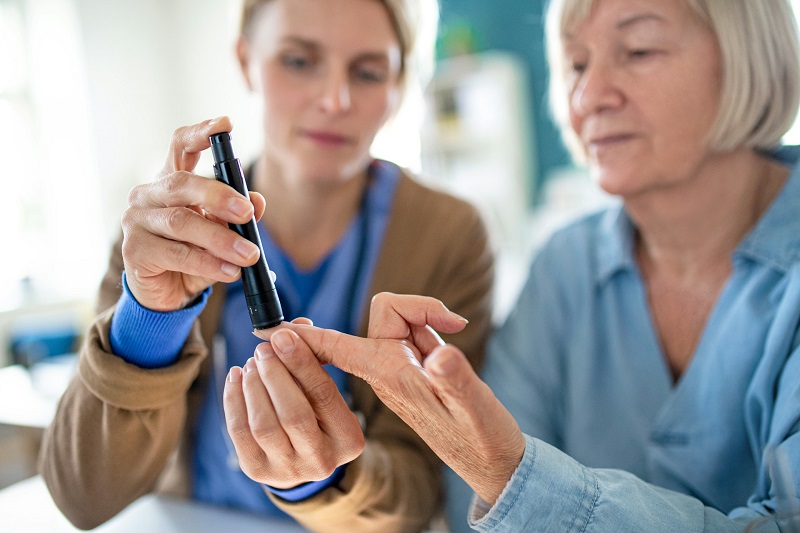Diabetes is a disease that affects 21.1% of adults in Malaysia in 2024 according to data from the International Diabetes Federation (IDF). Taking...
Vous n'êtes pas connecté
- English
- Français
- عربي
- Español
- Deutsch
- Português
- русский язык
- Català
- Italiano
- Nederlands, Vlaams
- Norsk
- فارسی
- বাংলা
- اردو
- Azərbaycan dili
- Bahasa Indonesia
- Հայերեն
- Ελληνικά
- Bosanski jezik
- українська мова
- Íslenska
- Türkmen, Түркмен
- Türkçe
- Shqip
- Eesti keel
- magyar
- Қазақ тілі
- Kalaallisut ; kalaallit oqaasii
- Lietuvių kalba
- Latviešu valoda
- македонски јазик
- Монгол
- Bahasa Melayu ; بهاس ملايو
- ဗမာစာ
- Slovenščina
- тоҷикӣ ; toğikī ; تاجیکی
- ไทย
- O'zbek ; Ўзбек ; أۇزبېك
- Tiếng Việt
- ភាសាខ្មែរ
- རྫོང་ཁ
- Soomaaliga ; af Soomaali
Headings :
 Maroc - THECEKODOK.COM - A La Une - 02/10/2024 21:52
Maroc - THECEKODOK.COM - A La Une - 02/10/2024 21:52
Another Diabetes Patient Successfully Treated Using Stem Cells
Is diabetes going to be a disease that can finally be treated? This is because another type-1 diabetic patient has been successfully restored using stem cell treatment in China. After receiving a bone marrow transplant procedure, a 25-year-old woman who had diabetes for 11 years no longer needed insulin injections for a year.The treatment was developed by scientists from Tianjin First Central Hospital, Peking University, Changping Laboratory and Hangzhou Reprogenix Bioscience. They take the patient's adipose tissue which is then transformed into stem cells. It is then transformed into islet cells before being transplanted into the patient's abdominal muscles.Islet cells are responsible for producing insulin in the human body. The need for daily insulin injections begins to decrease after two weeks before no longer being needed after 75 days. The patient's body produced its own insulin again and he was successfully treated.What makes the success of this Chinese scientist unique is that the islet cells were transplanted into the abdominal muscles instead of the patient's liver as was done on the first human recovered from diabetes three years ago in the United States. Transplantation to the abdominal muscles is easier than to the liver because it does not require complicated surgery. The study was published in the journal Cell.
Articles similaires
Scientists Develop Insulin That Can Be Taken Through Skin-Applied Gel
Diabetes is a disease that affects 21.1% of adults in Malaysia in 2024 according to data from the International Diabetes Federation (IDF). Taking...
Technique using pig liver extends transplant window
A CHINESE research team has successfully used a gene-edited pig liver in an extracorporeal perfusion therapy to treat a patient with acute liver...
Technique using pig liver extends transplant window
A CHINESE research team has successfully used a gene-edited pig liver in an extracorporeal perfusion therapy to treat a patient with acute liver...
New living implant could reduce insulin injections for diabetes
A groundbreaking new study offers hope that people with diabetes may no longer need to take insulin injections every day. The research, published in...
Chinese breakthrough in extracorporeal cross-circulation technique using pig liver extends transplant window for patients
XI'AN, Feb. 5 (Xinhua) -- A Chinese research team has successfully used a gene-edited pig liver in an extracorporeal perfusion therapy to treat a...
Chinese breakthrough in extracorporeal cross-circulation technique using pig liver extends transplant window for patients
XI'AN, Feb. 5 (Xinhua) -- A Chinese research team has successfully used a gene-edited pig liver in an extracorporeal perfusion therapy to treat a...
Universal Kidney That Can Be Donated to Everyone Developed by Scientists
The shortage of donated organs is why the xenotransplant technique using pig organs was developed more than a decade ago. Its development has improved...
The Silence Of The Waiting Rooms – OpEd
Recent studies reveal a striking statistic: over the last decade, approximately 30% of primary care physicians have either retired or switched to...
Doctor apologises after not telling patient bone graft came from dead donor
The doctor apologised after being made aware the use of the tissue was against the patient's cultural and religious beliefs.
Latest releases
-
Samsung Expands Partnership With Toyota To Digitally Transform Dealerships in New Markets
Samsung Malaysia Electronics - 03/10/2025
-
Tourism Malaysia Hosts Hotel Data Refinement Session in Sarawak Ahead of Visit Malaysia 2026
Tourism Malaysia - 10/07/2025
-
Tourism Malaysia celebrates the official launch of Cambodia Airways
Cambodia Airways - 07/07/2025




